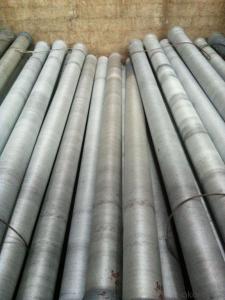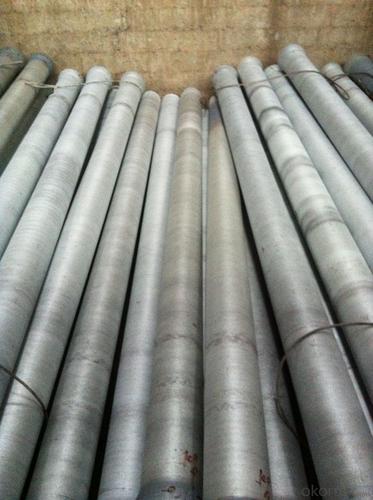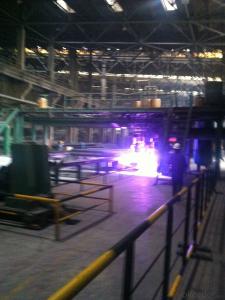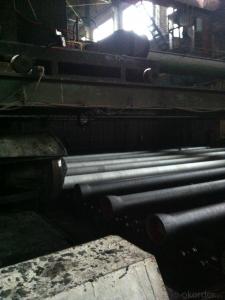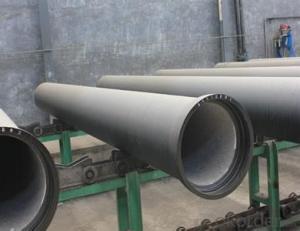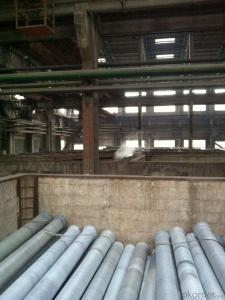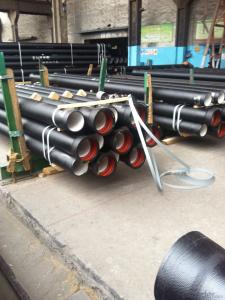DUCTILE IRON PIPE AND PIPE FITTINGS K7 CLASS DN900
- Loading Port:
- Tianjin
- Payment Terms:
- TT OR LC
- Min Order Qty:
- 32 pc
- Supply Capability:
- 3000 pc/month
OKorder Service Pledge
OKorder Financial Service
You Might Also Like
· Material : Ductile Cast Iron
· Size Range : DN 80mm to DN 2000mm
· Unit Effective Length : 6m or 5.7m
· Manufacture Standard: ISO 2531:1998/ EN 545:2006/EN 598:2007
· Annual capacity : 200,000 tons
· Coating Exterior: Zinc 130g/m2 according to ISO 8179-1 and bitumen coating 70 microns.
· Cement Interior: Portland Cement/ High Alumina Cement/ Sulphate Resisting Cement Lining according to ISO 4179
· Special requirements on external coating and internal lining can be applied
· We also provide accessories such as SBR/EPDM rubber gaskets, lubricant paste, pipe caps, PE sleeves, etc.
Additional Parts:
Each pipe is strictly inspected according to related standard to ensure permanently high performance.
Easy Installation at site and service free for life
Long Service Lifespan
Quotation will arrive you within 24hours once we get your inquiry.
We guarantee offering you a competitive price.
A copy of original inspection reports of pipes will be offered after shipment.
Photos of loading process will be sent to the customer after shipment effect.
We will follow-up the delivery progress after shipment effect and update to the customer on weekly basis.
- Q: Are ductile iron pipes suitable for installation in areas with high seismic activity?
- Areas with high seismic activity are well-suited for the installation of ductile iron pipes. Their ability to withstand external loads and ground movement is a key advantage, making them ideal for seismic zones. In fact, these pipes possess excellent flexibility and high tensile strength, enabling them to endure ground shifting and seismic forces without breaking or fracturing. Additionally, their high resistance to impact and stress decreases their vulnerability to damage during seismic events. Furthermore, the performance of ductile iron pipes in seismic areas has been extensively demonstrated. They have been successfully implemented and utilized in earthquake-prone regions worldwide for numerous years, showcasing their capacity to endure ground movements caused by seismic activity without jeopardizing their structural integrity. Moreover, ductile iron pipes offer the added benefit of being highly durable and long-lasting, which is vital in high seismic areas where infrastructure must withstand frequent ground movements. Their extended lifespan reduces the necessity for frequent maintenance and replacement, resulting in a cost-effective option in the long term. However, it is crucial to note that proper installation techniques and adherence to seismic design guidelines are imperative to ensure optimal performance of ductile iron pipes in high seismic areas. Consulting experienced engineers and adhering to local building codes and regulations is recommended to guarantee correct installation and the ability to withstand the specific seismic conditions of the area. Overall, due to their flexibility, strength, durability, and proven performance, ductile iron pipes are regarded as a suitable choice for installation in areas with high seismic activity.
- Q: Can ductile iron pipe be used for horizontal directional drilling?
- HDD, a trenchless method for installing underground utilities like pipelines, can indeed utilize ductile iron pipe. The choice of ductile iron pipe in HDD projects stems from its remarkable strength, durability, and ability to withstand the strains and stresses associated with directional drilling. It exhibits exceptional resistance to external loads and can endure the bending and pulling forces involved in HDD installations. Nevertheless, it is crucial to consider variables like pipe diameter, wall thickness, and soil conditions when selecting the appropriate pipe for HDD projects. Furthermore, it is imperative to adhere to proper installation techniques and take precautionary measures to ensure the long-term performance and integrity of ductile iron pipe in HDD applications.
- Q: Can ductile iron pipes be used for both water and wastewater applications?
- Yes, ductile iron pipes can be used for both water and wastewater applications. Ductile iron pipes are known for their durability, strength, and corrosion resistance, making them suitable for a wide range of applications including water distribution, sewage systems, and wastewater treatment plants. These pipes are designed to withstand high pressure and are capable of handling the flow of both water and wastewater. Additionally, ductile iron pipes have a long lifespan, reducing the need for frequent replacements and maintenance, which makes them a cost-effective choice for both water and wastewater applications.
- Q: Can ductile iron pipes be used for trenchless pipe rehabilitation methods?
- Trenchless pipe rehabilitation methods offer a way to repair or rehabilitate existing pipelines without the need for extensive excavation or trenching. In these methods, ductile iron pipes are often used due to their durability, strength, and resistance to corrosion. Various trenchless methods, such as pipe lining, pipe bursting, and slip lining, can be used to rehabilitate ductile iron pipes. These methods involve inserting a new lining or pipe inside the existing ductile iron pipe, which helps to extend its lifespan and improve its structural integrity. Ductile iron pipes are the preferred choice for trenchless rehabilitation because they can withstand the forces and pressures involved in the process, providing a reliable and long-lasting solution.
- Q: Are ductile iron pipes resistant to acid mine drainage corrosion?
- Yes, ductile iron pipes are generally resistant to acid mine drainage corrosion. Their high durability, strength, and corrosion resistance make them suitable for transporting water in acidic environments, such as those affected by acid mine drainage.
- Q: Does the cast iron have size 250? What's the performance?
- Ductile iron does not have size 250. Ductile iron is the beginning of QT, QT400-15, QT450-10, QT500-7 is the general use of nodular cast iron brand. Nodular cast iron welding can be determined, this should be in some high strength cast iron equipment used more, the tensile strength of normally ductile cast iron welding in welding is higher, is worse than the grey cast iron, it is actually very difficult to distinguish with the naked eye is ductile iron or cast iron the iron in the repair equipment, we usually use WE777 special cast iron electrode universal wide welding, but it is only for maintenance use, the effect is really good, reducing the risk of cracking and high strength welding rod matching to ensure the strength of welding seam.
- Q: Do rigid cement cast iron pipes need cement piers?
- Ductile iron pipes mainly called centrifugal ductile iron pipe, it has the properties of nature, iron and steel, excellent corrosion resistance, good ductility, good sealing effect, simple installation, mainly for municipal, industrial and mining enterprises, water supply, gas, oil etc.. Water supply pipe is the first choice, with high cost performance. Compared with the PE pipe, from the installation time, ductile pipe PE pipe installation is simple and rapid, and after the installation of internal and external pressure bearing better tightness and corrosion resistance; from the point of view, ductile pipe sealing better after installation, but also can improve the corrosion resistance of corrosion protection through a variety of means; from the hydraulic performance, because ductile pipe specifications generally refers to the inner diameter of PE pipe diameter specifications generally refers to the same specifications, because under the condition of ductile pipe can achieve greater runoff; from the installation and maintenance cost, ductile pipe have more favorable price. The main components of ductile iron pipes are carbon, silicon, manganese, sulfur, phosphorus and magnesium. The inner wall of zinc spray, anti-corrosion materials such as cement mortar.
- Q: Can ductile iron pipe be used for road and highway crossings?
- Ductile iron pipe is indeed suitable for road and highway crossings. This material, known for its strength and durability, is ideal for underground infrastructure projects like road and highway crossings. Its remarkable ability to withstand heavy loads, corrosion, and external forces makes it the perfect choice for enduring the traffic and environmental conditions commonly encountered in road and highway crossings. Moreover, ductile iron pipe comes in different sizes and strengths, offering customization options to meet the specific needs of the crossing. To maximize the longevity and performance of ductile iron pipes in road and highway crossings, it is crucial to follow proper installation techniques and adhere to relevant industry standards.
- Q: Ductile iron pipe, socket connection, pipe length, you can cut open it?
- Yes, but the pipe that needs cutting is a cut off pipe with a scissors mark.
- Q: What material is ductile cast iron 235A?
- Pig iron is an alloy of iron and carbon carbon content more than 2%, pig iron carbon content is generally in 2.5%--4%, including C, SI, and Mn, S, P and other elements, is the use of iron ores in blast furnace products. According to the different forms of carbon in pig iron, and can be divided into pig iron, cast iron and steel ball ductile cast iron. Several precipitation of spherical graphite cast iron. The cutting action on the metal substrate than spheroidal graphite flake graphite cast iron, the strength of the matrix organization strength of 70 ~ 90%, the tensile strength is up to 120kgf/mm2, and has good toughness. Ductile iron chemical composition besides iron usually contains: the amount of carbon 3.3.8%, silicon 2.3.0%, manganese, phosphorus, sulfur and no more than 1.5% of the total amount of rare earth, magnesium spheroiditic agent.
Send your message to us
DUCTILE IRON PIPE AND PIPE FITTINGS K7 CLASS DN900
- Loading Port:
- Tianjin
- Payment Terms:
- TT OR LC
- Min Order Qty:
- 32 pc
- Supply Capability:
- 3000 pc/month
OKorder Service Pledge
OKorder Financial Service
Similar products
Hot products
Hot Searches
Related keywords
